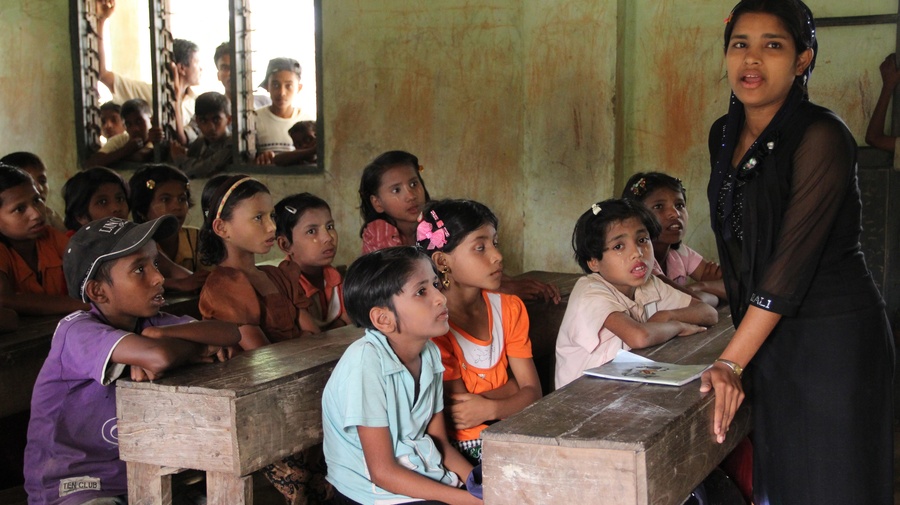Young Muslim woman's fierce passion for learning sparks big changes
Young Muslim woman's fierce passion for learning sparks big changes

Rozeya teaches a classroom of students at a middle school in Myanmar's Rakhine state. The 21-year-old battled her conservative society, poverty and sceptical teachers to get an education.
PHAUNG DAW PYIN, Myanmar, May 11 (UNHCR) - With her quiet voice and demure manner, 21-year-old Rozeya is not an obvious pioneer. But over a large swathe of Myanmar's northern Rakhine state, this young Muslim woman's steely determination to overcome obstacles is convincing many fathers and religious leaders of the importance of educating girls, and has turned her into a role model for teenage girls.
"It's always been common for boys to get education, but not girls," says Rozeya, the first resident of UNHCR-sponsored girls' hostels to pass the national matriculation exam. "But now it's changing."
Rozeya, like many people here, goes by only one name. Along with her two older sisters, she was passed over for education and stayed at home in the hamlet of Phaung Daw Pyin while her two younger brothers were sent off to school.
Her father, a 55-year-old basket maker and widower who struggles to support his family on the equivalent of 60 US cents a day, saw no point in educating girls. Even if they go to primary school, by tradition Muslim girls here have to drop out at puberty, stay behind closed doors and wait to get married.
Awli Ahmed's change of heart came one day in a market while trying to buy the raw material for his bamboo baskets. He could speak only his local dialect and the vendor could speak only Burmese. They finally found an educated girl to interpret.
"He came home and said one of his daughters should study and get an education," Rozeya recalls, taking a break from teaching middle school in another UNHCR-funded programme.
Today, her father's pride glows in every soft-spoken word. "Because of Rozeya now many girls want to study," says Awli Ahmed, outside his daughter's classroom. But it wasn't easy getting here. Since Rozeya had already missed out on primary school, she tried to catch up by enrolling in a children's language programme sponsored by the UN refugee agency.
After one glance, the teacher judged her to be too young and sent her away, even though she was actually old enough to qualify. Undeterred, Rozeya went to class every day regardless- until the teacher finally relented and allowed her to replace a drop-out.
Food supplied by another UN agency, the World Food Programme, convinced Awli Ahmed to keep her in class because the whole family could share the rations.
As she sped through primary and secondary school, her father fended off pressure from other villagers and religious leaders who wanted Rozeya to drop out and come home. "It's because my whole family was supporting me that I was able to overcome all the obstacles on my way," Rozeya says.
In 2008, she joined the first group of girls to move into the UNHCR-funded girls' hostel in Taung Bazar, a dangerous 90 minute walk from her hometown. UNHCR funds Community and Family Services International of the Philippines to run three hostels in this area.
The hostels not only give girls from poor remote villages a place to live while attending state schools, but also provide extra lessons and teach them social skills.
Her whole class from the Taung Bazar hostel failed the national matriculation exam on their first try in 2009. Rozeya was the only one to make a second stab at it, and she passed the following year. She's back teaching very close to her home hamlet and changing attitudes by her very presence.
"When I first started travelling around, many mullahs looked at me with an uneasy eye," she says. "But now they appreciate my work. Almost the whole community is happy to receive me back." What's more, many of the mullahs who are now trying to secure places for their own daughters.
At the Taung Bazar hostel, the 19 girls now in residence cite Rozeya's exemplary study habits and achievements as their own inspiration. "There are no women engineers from this area so I want to become the first one," says 16-year-old student Tawsmin, one of seven children from a hamlet of only 28 houses.
"Most of the families are poor, so the girls have to go to the mountains and deep jungle to collect firewood [to sell]," Tawsmin explains. "When I went home for the break, all the village girls told me I was different after living in the hostel. They said, 'You are so changed in your appearance, your bearing, your confidence, your communication.' They were really impressed."
Back at the middle school where Rozeya has taken a break from teaching Burmese, she reflects on how different her life would have been if she had not single-mindedly pursued her education.
"I would just sit at home 'behind the curtain,' never going out of the house, waiting to get married. Or maybe I'd be a housemaid in the village or grilling chili peppers" to earn a pittance, she adds. Instead, she's determined to get a university education and says "I'd like to become an English teacher, go back to work at one of the hostels and eventually work for UNHCR."
By Kitty McKinsey, in Phaung Daw Pyin, Myanmar











